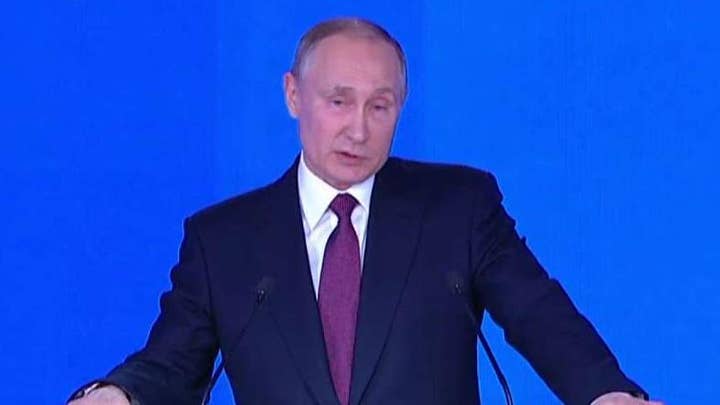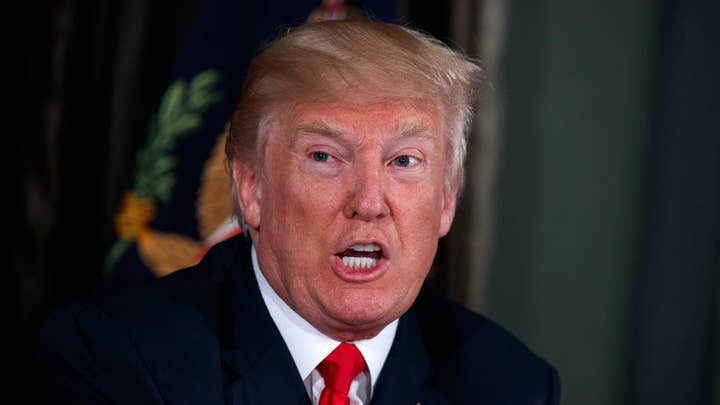Could Nancy Pelosi become House Speaker again?
Marc Lotter, former special assistant to President Trump, and Mark Penn, former Hillary Clinton 2008 presidential campaign chief strategist, on the Democrats' rebuttal to the Republican FISA memo and the midterm elections.
Certain moments on Capitol Hill capture the agility it takes to be in the loyal opposition.
House Democratic Leader Nancy Pelosi’s critique of the White House response to two different nuclear threats is one of those moments.
On Friday, the California Democrat slammed the Trump administration for its “silence” on Russian President Vladimir Putin’s bellicose address earlier this week boasting of nuclear weapon and missile technology that would render Western defenses “useless.”
“President Trump’s decision to turn a blind eye to Putin’s overt threats of nuclear aggression puts Russia before the interests of America,” Pelosi said.
But Pelosi took the opposite approach back in August 2017, blasting Trump when he responded to Kim Jong Un’s nuclear threats by warning of “fire and fury” from the United States.
Back then, Pelosi condemned his “recklessly belligerent” comments, saying the “saber-rattling and provocative, impulsive rhetoric erode our credibility and weaken our ability to reach a peaceful resolution to this crisis.”
She wasn’t the only one. Trump’s comments at the time stunned lawmakers and world leaders – and were seen as risking a military confrontation with North Korea that analysts have long predicted would be devastating for both sides.
In light of that experience, Pelosi’s Democratic colleagues openly hoped the president would take a more sober approach this time.
“I hope he doesn’t come up with some adolescent outrageous tweet for goodness sakes,” Sen. Dick Durbin, D-Ill., said Thursday. “You know the leader of the free world, the commander in chief of the United States of America ought to take the threat of Russian aggression very seriously and in a sober way.”
And so far, Trump has not taken the bait from Moscow – despite Pelosi’s suggestion he should hit back.
Some have even downplayed Putin’s threats.
Two U.S. officials briefed on the latest intelligence about Moscow’s military capabilities said the nuclear-tipped and nuclear-powered cruise missile Putin boasted of is not yet operational.
“The nuclear-powered cruise missile Putin bragged about has actually crashed a few times,” during recent testing in the Arctic, one official said.
Asked about defending against a Russian cruise missile attack, an official acknowledged the “limited” U.S. defensive capabilities, with only 44 anti-ballistic missile interceptors in the ground in Alaska and California, first fielded in 2006. The Pentagon plans to put dozens more interceptors in the ground in the coming years. But they are designed to take out only a small number of missiles from rogue states, like North Korea, and not match an overwhelming missile attack from Russia.
“Nothing’s different today than it was yesterday. If they nuke us, we will nuke them back,” one official said.
Pelosi’s critique on Friday went beyond Trump’s “silence.”
She also suggested his earlier “insistence on ramping up warhead production” provoked Putin, and faulted him for failing to fully enact sanctions – while again suggesting the Russians have leverage over the president amid the ongoing Moscow meddling probe.
“The President must immediately reverse his pro-nuclear agenda and condemn Putin’s aggression,” she said. “President Trump again and again gives Putin a free pass, from refusing to enact the sanctions that Congress required to refusing to investigate Russia’s attacks on our election systems. The President’s consistent failure to hold Putin accountable should make us all ask, what do the Russians have on Trump, politically, personally and financially?”
Fox News’ Lucas Tomlinson and Jason Donner contributed to this report.







